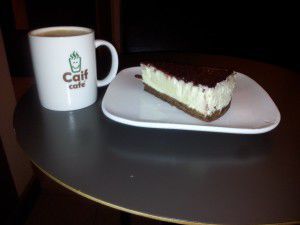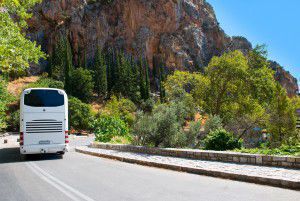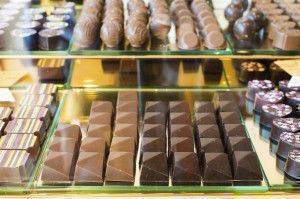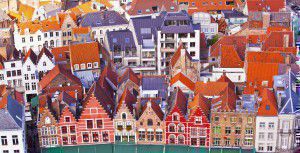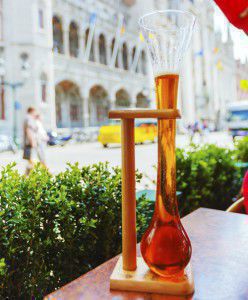Breaking down barriers with The Broke Backpacker
Meet Will. He’s the writer and adventurer behind travel blog The Broke Backpacker, and he just embarked on an epic two-year journey from home in the UK to Papua New Guinea.
The twist? He’s not taking any flights. Oh, and he’s travelling on a daily budget of $30.
Will’s been on the road already for two weeks, and is currently making his way through Europe. Over the next two years he’ll be visiting 30 countries, including Turkey, Pakistan, Myanmar, Tibet, and Indonesia, and sharing his adventures along the way.
Why are we telling you this?
Well. When we heard what he was planning, we figured Will might find himself in need of an app that includes over 120 languages from all across the world, which would enable him to talk to people wherever he goes.
Fortunately, it just so happens we have an app like that. So we’re very excited to announce that uTalk is the official language sponsor of Will’s adventure, and he’ll be using the app on the road to learn and speak everything from German to Tajiki, Albanian to Khmer. He’ll even be able to greet people in Tok Pisin on his arrival in PNG.
Will’s been travelling for seven years, and knows how important it is to speak a bit of the local language: “Learning a new language is hands down the best way to make new friends and peek behind the curtain. uTalk helps me to break down barriers, learn the local lingo and make friends in the most unexpected of places.”
We can’t wait to follow Will as he makes his way across the world, visiting some fascinating countries and meeting loads of interesting people. And we’re looking forward to hearing him speak all the languages 😉
You can follow Will’s adventures on Twitter or Facebook, or for more instant updates, on Snapchat (@wthatton).
A trip to Riga
At the risk of sounding like a Eurovision host… greetings from Latvia!
I don’t have the sparkly outfit or the slightly dodgy English accent (although some may disagree with that), nor am I looking for my five minutes of fame. So perhaps less Eurovision host, more lazy wanderer.
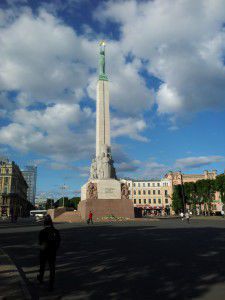 I find myself in the beautiful city of Riga for a few weeks, and after only a few days, I can say it is a good choice with lots to explore.
I find myself in the beautiful city of Riga for a few weeks, and after only a few days, I can say it is a good choice with lots to explore.
Riga has become a ‘must see’ for many a traveller, a mid-point on the popular route between Tallinn and Vilnius.
The time difference is +2 GMT and it’s a little surprising to find the sun rising at 3 in the morning when the evenings draw in much the same time as they do in the UK.
The temperature is actually like the best bits of the UK summer and sometimes hotter, but that can be significantly reduced by the wind.
The currency is the euro, the prices are relatively cheap, the local supermarket is Rimi.
Everything is pretty central and the airport is accessible by little more than half an hour by bus for around 2 euros.
So, that’s the stats and stuff.
So what’s Riga really like?
Well, if you’ve been to Budapest, it’s quite similar. A lot of the cities over this way are like that: where communism still flavours the architecture yet the need for growth and change is evident in the modern buildings that have sprung up amongst them.
The main thing you’ll realise about Riga on arrival is the parks. Everywhere you look there are beautiful parks, with statues, floral sculptures, sailing boats, cafes, and sometimes a ‘summer stage’ where I’m told there are free performances. If you’re a park-bencher – book, beer, cake, coffee – this place is beyond perfect. You could probably do a full tour of all the benches and be here for months!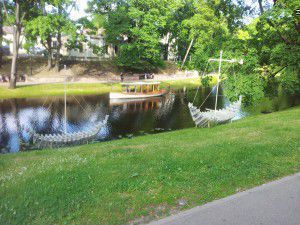
It’s a ‘shoes off’ culture so be prepared to bare feet the moment you arrive in a hostel or home. Also be prepared for the supermarkets to stop selling alcohol around 7:30. Stock up, early!
The traffic lights can be very quick changing so do not dawdle. You’ll be alerted by a series of beeps. When the beeper beeps, get going!
There is a great central market and if you go inside there are a lot of stalls selling local fare. Prepare to put on weight. It is pastry-central here. I haven’t tried savoury Latvian food yet, but that day will come.
Whilst English is not spoken everywhere, the locals are used to the poorly multi-tongued English speaker, and are patient and on the whole very kind.
It’s too soon to tell but I imagine a week would be an adequate length of time to see everything there is to see of Riga. But, since I’ll be here for a while yet, perhaps I can provide a little more detail on that in the near future.
But until then, and until I sample the local beer… Priekā! (cheers)
Kelly
The Long And Winding Road… of Long Distance Bus Travel
If you’re on a budget or just want to indulge in a bit of thinking time, travelling across Europe by bus could be the thing for you. With numerous companies offering fantastic prices, it’s a wonder that more people haven’t partaken in this not-so-secret method of transport.
Based on two particular routes*, here are some ‘dos and don’ts’ from our own personal experience.
Checking In
If you are travelling from the UK, Victoria Coach Station insist on you being available to check in at least one hour before departure. From other countries it is usually around half an hour maximum.
Check in normally involves only showing your ticket or reference number, however in some places there will also be an additional check of your ID card or passport.
If you want to guarantee a window seat or that your luggage is on first, face the fact that you will have to queue. Embrace it. Or at least prepare some good music to dance to whilst waiting.
Luggage
Whilst coach companies are very generous and often overlook oversized luggage, don’t get too greedy. Luggage limits are usually around 25kg and it’s mostly okay to go over that – although not with your entire house. On a very recent trip one single traveller was furious that her guitar, record player, large holdall, large backpack, and two very large suitcases were deemed too much. Shocking.
On The Bus
Thankfully coach seats do not recline as much as plane seats might, but there will always be someone who believes they alone need all the body space and legroom that is/isn’t available.
Mind where you sit. If you’re someone who needs the toilet regularly then you have to weigh up the pros of being close to the toilet with the cons of constantly hearing the door slam and the toilet flush – amongst other things.
Also. Take tissue with you. The one solitary toilet roll that is often installed in coach toilets pretty quickly disappears, so if you need to use the facilities more than two hours into the journey, take your own supply.
Trips to the toilet in the middle of the night can either be a human assault course or a foot fetishist’s idea of heaven: those lucky enough to not have to share a seat will sprawl out as best they can, with feet both socked and bare blocking your way. Do what you will.
Take headphones or earplugs. You are guaranteed to have either one token unhappy child or one potentially unstable adult who feels the need to tell everyone their life story. Look busy. At all times.
A small blanket is a very good idea for the coach, no matter the season you travel in. There’s nothing worse than attempting to sleep as a contortionist might, when there’s a breeze coming in on your back or you are shivering.
If you board a bus that originates from the UK, and you happen to have a UK adapter/plug, guard it with your life. For once other unprepared passengers are aware of this little treasure, everyone will suddenly want to befriend you and ‘borrow’ it.
Regular Stops
When there is a stop, use the toilet. Whether you feel the urge or not. If nothing else it is an opportunity to wash your hands thoroughly as the sinks in coach toilets always seem to have the smallest trickle of water and very little soap.
Take plenty of change with you for the vending machines at service stations. Not only will this work out cheaper than buying a ‘proper’ coffee at every stop, you will also be pleasantly surprised by the range and quality of hot beverages available. Especially in France. May we recommend the vanilla cappuccino.
Crossing The Channel
Depending on the time of day, you will either face the claustrophobic challenge that is the Channel Tunnel, or walk around a ferry at your leisure for around an hour before trying to find your coach again at the last minute. The ferry feels much more civilised as you can lounge on sofas or pace up and down the deck, but the Tunnel is much faster.
Be prepared for long delays at the border. It can either take under half an hour to go through the two separate controls for France and England, or it can take two hours. It depends on if they feel like checking your luggage as well as your passports, if they want their sniffer dogs to check you over, and if your fellow passengers who need visas have filled in or need help with filling in their paperwork.
Pet Peeves And Pluses
The main pet peeve of long distance coach travel, it has to be said, are Those People. You know the ones. Those who feel that every single stop, be it to refuel or for the driver to change, is their own personal cigarette break. Those that when the driver says there is a 45 minute break, decide to casually stroll into the service station five minutes before departure and delay the coach with their hot drinks that the driver has clearly said are not allowed onboard. Those that are veterans of the journey and will not leave the driver alone for a moment, or will give the entire coach a loud, running commentary the entire route.
A big plus is the long stops when changing buses. Stopping in Paris for 3 hours gives you ample time to wander to the Eiffel Tower and Arc de Triomphe as well as popping into a patisserie for a cheeky pastry for your petit dejeuner.
It does have to be said though, at least in our experience, that the drivers make the journey. They are jolly, they tell bad jokes, and they cheer you on with gusto to encourage you to get through the border control quicker than their previous coach passengers. Definitely an added bonus that will make you smile.
Bus travel. It isn’t for everyone. But perhaps it is for you.
Kelly
One more plus from us: you’ll meet loads of interesting people on your bus journey. Why not download uTalk for iOS, so you’ll always know how to say hello, even if you’re from different countries?
*Budapest to London, via Eurolines, with a travel time of 26 hours and 45 minutes. Calling at: Győr, Vienna, Linz, Liege, Brussels, Ghent, Lille and Dover before terminating at Victoria Coach Station, London.
Barcelona to London, via Megabus, travelling for approximately 26 hours. Calling at: Toulouse, Brive, Paris and Amiens and terminating at Victoria Coach Station.
10 reasons to visit… Bruges
Have you ever visited a city that managed to change your mind?
I visited Bruges earlier this year. Unfortunately, I’d accidentally timed my visit to coincide with the enthusiastically named ‘Amateur Arts Festival’, and consequently spent Saturday night with tissues rammed in my ears and arms clenching pillows to my head, as my hotel room shook with the relentless noise of amateur bass. I thought then that the chances of coming up with ten reasons to visit Bruges were pretty slim. Yet on Sunday morning, with the loudspeakers in the square finally silenced and the sun out, I became enchanted with this town that everyone always refers to as a peaceful haven of canals. These are the things which managed to turn my opinion around in the space of just one morning.
1. Trains
I get a bit excited about foreign trains, I know, but going to Bruges presented me with a new wonder: the double decker train. True, this is not localised to Bruges alone but most of the IC trains from Bruxelles seemed to be two storeys high, giving a fantastic view of the very flat countryside (and occasional windmill!) from the top deck. The trains are smooth and cool, and the conductors wear an amusing flat cap as part of their uniform. If you’re just planning a short visit to Bruges, you can get the Eurostar to Brussels and travel on from there (it’s about an hour on the fast train, two hours on the slow train).
2. Canals and boat trips
I wouldn’t say the town is riddled with canals in the same way Venice or Amsterdam are, but they linger in the backstreets and circle the centre so that you stumble across them when you wander off the main street. Surprisingly, there didn’t seem to be any locals drifting around on pleasure boats, although there were a few promising houses whose main doors seemed to lead out directly onto the canal. Activity on the waterways instead seemed to be wholly dominated by the tour boats, taking cargoes of visitors on half hour drives up and down the canal, streaming off fluent speeches in three languages as they went. If you’re only there for a short time, I’d advise a boat trip to get your bearings on the town, and to see some impressive buildings from otherwise undiscovered angles.
3. Chocolate
Belgium is world-famous for chocolate and there are lots of chances to sample it in Bruges. Having been there just after Easter, lots of independent chocolate shops were still displaying elaborate chocolate rabbits and chicken-shaped Easter eggs, as well as the usual array of picturesque truffles and pralines. It being the weekend, there didn’t seem to be anyone around making the chocolates, which was a pity, but I imagine that in the week you’d get a good look at the chocolatiers at work. I was particularly impressed with a small boutique called Stef’s, which sold chocolate tools dusted with cocoa to make them look rusty – I was entirely taken in until I decided it was highly unlikely that a food shop would fill its window with rusty tools.
4. Walking
Bruges, although it also has lots of famous sights, is perfect for the lazier tourist who just wants to meander and drink in the tranquil beauty. Cobbled streets with broad flat pavements and gentle bridges over canals provide a little haven to lose yourself in, and since the whole town is very small you soon enough stumble upon some familiar street or building to set you back on route. Horse drawn carriages trot past every so often, carrying bands of eager-eyed tourists, A particularly pretty walk turned out to be the wide promenade from the station into town (a very short stroll and definitely not worth getting the bus unless you have heavy luggage), which passes a beautiful pink-flowered war memorial and glides into the centre of town and some pretty little cafés.
5. Houses and architecture
The typical Flemish façade presides here, and people seem to take enormous pride in their property, keeping every gate neatly painted and every tile in place. With a maximum height of 30m for any building in the city, the scenery is all low-lying and the views from any high points are panoramic. Some interesting and very modern architecture brings a new sense of style to the traditional steep-roofed old houses.
6. Brewery
At one point home to over 50 breweries, Bruges now has only one active one, De Halve Maan brewery, which runs daily tours around its compact factory in the heart of the city. The tour, in Dutch, French and English, is definitely worth going on as it is stuffed full of information and lots of insights into why beer is healthy (an argument I always like to hear). They’ll also tell you that back in the ’50s the breweries would do home deliveries – you just had to ring a bell for the cart to stop and dispense beer to you directly. I imagine it’s no longer feasible to re-introduce this practice, but we can always dream… Having climbed right to the top of the factory and experienced the lovely view, you are released at ground level to claim your free beer in the spacious bar-restaurant, where one beer can easily turn into a happy afternoon sampling all the brewery’s many offerings.
7. Bike pumps
I’ve seen these around a little more recently – the free foot-operated bicycle pump – and I’m always impressed with a town that spends its money on something as practical and helpful as this.
8. Coffee…
and cake. This doesn’t need much explanation really: in Bruges, you can sit at a table on a cobbled pavement outside a bakery with exquisitely executed cakes and sip a small cup of intense black coffee. Although waffles seem to be the thing to have in Belgium, my favourite snack is the florentine – not a native Belgian sweet but nonetheless available in every cake shop.
9. Beers and beer glasses
Almost as attractive as the idea of sitting in a bar all day trying all the different beers is the idea of trying out all the different glasses. That may sound geeky but there are some really fun ones, including the absurd Kwak beer glass whose bulbous end makes it impossible to put down without the proper stand, and the La Corne drinking horn (which you can clink with a fellow Viking over a drinking toast and which, again, cannot be propped up except with the stand it comes served in). Good bartenders, the Belgians will tell you, will never serve a beer in the wrong glass, and each beer has its own glass, most of which are shaped like a chalice or a tulip.
10. Shopping
If this is what you’re after, you won’t be disappointed in Bruges. With a long, meandering high street full of clothes and chocolate shops, as well as a large market and side streets offering endless souvenirs, you could spend a day just in the shops. And if you’re looking for a bigger centre, Brussels is only an hour or so away by train, and Ghent is neatly stuffed in between the two, to make a weekend of it.
Have you been to Bruges? What were your highlights?
Nat
What’s so good about Eurovision?
This Saturday is the final of the Eurovision Song Contest 2014 in Denmark, with 125 million people expected to watch across Europe and beyond. The contest, now in its 59th year, has become known for its wacky performances and tends to divide opinion; while some people love it (although maybe not as much as this man), others claim to find it tacky. But I think most people can agree that whether you take it seriously or not, Eurovision is good fun. (Even if sometimes you need a drink or two to help you through it.) Here are our ten favourite things about Eurovision:
1. Russian Grannies
I had to put this first because it was one of my favourite ever Eurovision moments. The song on its own is fairly forgettable, but what made it amazing was the elderly ladies who managed to incorporate baking into their performance at the 2012 contest. I’m still not sure what it had to do with a Party for Everybody, but it was brilliant, and I’m still disappointed that it didn’t win.
2. Riverdance
The Irish dance act were first discovered when they performed during the interval of the Eurovision Song Contest in 1994. Known for its amazing synchronicity, energy and rhythm, Riverdance went on to become a worldwide phenomenon. So if you’re not a fan, now you know who to blame.
3. Romanian rivalries
In the UK, it’s not seen as very ‘cool’ to enjoy Eurovision, but some other countries take it incredibly seriously. In Romania, for example, it’s a really big deal and apparently it’s traditional for the acts to try and win a place by discrediting their opponents.
4. The voting
How could I not mention the political voting? Half the fun of Eurovision is predicting who’s going to give points to who. Greece and Cyprus usually vote for each other, as do the Scandinavian countries and the Balkans. If that sort of thing interests you, this is a useful summary. Unfortunately, the political voting tends to leave the UK in a precarious position; we often get votes from Ireland, and sometimes Malta, but not very often from anyone else…
5. The UK
While we’re on the subject, let’s take a look at the UK’s Eurovision record. It’s hard to believe looking at recent history, but apparently it’s one of the most successful countries, winning five times since our first appearance in 1957. The last win was in 1997, with Katrina and the Waves, and since then we’ve not been doing so well, finishing last three times. The first of these was in 2003, when we scored an embarrassing ‘nul points’. Apparently this year’s entry, Children of the Universe, by singer-songwriter Molly, is expected to do well. I’ll believe it when I see it.
6. ABBA
It’s not often that a Eurovision act goes on to have a successful long term career, but one exception is Swedish group ABBA. Not only did they win the contest for Sweden in 1974, they went on to sell over 380 million albums worldwide. Their music also featured in the hit film Muriel’s Wedding and the award-winning musical, Mamma Mia! (And the movie version, which introduced the world to the singing ‘talents’ of Pierce Brosnan.)
7. Alcohol is Free
Regardless of your views on drinking, it’s hard not to tap your foot along to Alcohol is Free, by Koza Mostra and Agathonas Iakovidis, a.k.a. the Greek answer to Madness. They finished sixth in 2013.
8. Finland
We love Finland; they always come up with something memorable. Last year was the catchy Marry Me, which ended with that kiss, but nothing beats 2006 entry Hard Rock Hallelujah, by Lordi. Eurovision isn’t known for its heavy metal, preferring to stick to happy songs about how we should all love each other. But the alternative approach seemed to do the trick; the band won that year’s contest.
Warning: this video contains flashing lights and monster masks!
9. Language rules
Eurovision used to have a very strict rule about countries only singing in their native language, which has been lifted and restored a few times over the years. These days, many of the competing countries choose to perform in English, but some remain loyal to their own language; France and Spain are two examples. When I was growing up, there were more songs in other languages than there are today, and we used to enjoy turning on the subtitles and watching them struggle to translate the lyrics. Songs in English have won 28 times, followed by French, with 14 wins.
10. Fairytale
This was a popular choice in the EuroTalk office. Every now and again, Eurovision does actually produce a good song, and Fairytale was the one that we all thought of. The Norwegian entry for 2009 featured violinist Alexander Rybak, and won with a record-breaking 387 points out of a possible 492. For some reason, Alexander and his dancers were also a bit of a hit with the ladies…
Have we left out your favourite thing about Eurovision? Let us know in the comments!
Liz


